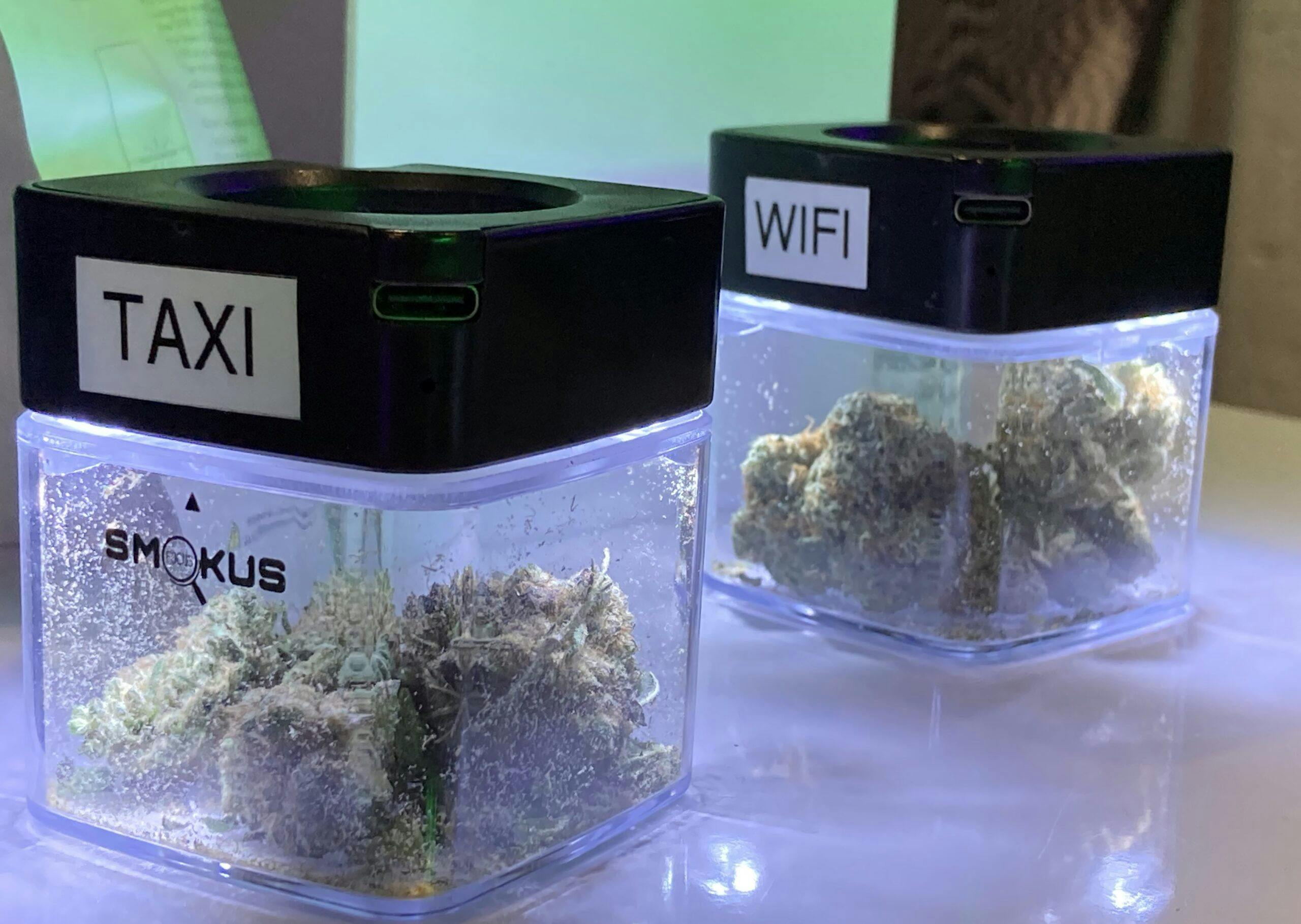Dispensaries in Brooklyn and other regions won’t get licensed until a federal court resolves a Michigan man’s claim that the licensing process discriminates against out-of-state operators, blocks interstate commerce, and is unconstitutional. The legal hold up could call the entire adult-use market into question.
A federal lawsuit will delay the issuance of dispensary licenses in Brooklyn, Finger Lakes, Central NY, Western NY, and Mid-Hudson. This signals a hold on at least 63 of the 175 new dispensaries planned, according to the geographic limits set forth by the state earlier this year. The state’s first dispensary licenses were slated to be awarded on November 21, but nearly half of those licenses are now in limbo.
A corporation called Variscite NY One, Inc. filed for preliminary injunction to restrain the Office of Cannabis Management (OCM) from issuing Conditional Adult-use Recreational Dispensary (CAURD) licenses in certain areas of the state, claiming the OCM dispensary license application program violates the Constitution by discriminating against out-of-state operators and blocking interstate commerce. Until the matter is resolved, no licenses can be granted in the five regions Variscite applied for a license in.
This case throws a wrench in the OCM’s upcoming plans to grant dozens of the dispensary licenses earmarked for individuals harmed by New York’s past marijuana laws.
Last week (November 10), U.S. District Court Judge Gary Sharpe granted a temporary restraining order to Variscite. The judge cited cases in Maine, Missouri, Oklahoma, and Michigan where similar laws were successfully challenged on constitutional grounds, including the Dormant Commerce Clause. The court ultimately ruled that the state’s application requirements “will have a discriminatory effect on out-of-state residents seeking a CAURD license.”
How did Variscite vs. the state of New York case begin?
The Variscite case was filed September 26, 2022, the exact day the August 25 to September 26 application window for CAURD applications closed. The Variscite business entity first registered with the state on August 31, less than a week after the CAURD application portal went live. Variscite’s lawyer, Christian Kernkamp, told Leafly via email November 15, “Plaintiff is not making a statement at this time but we will be sure to include you if Plaintiff makes a statement in the future.”
On October 5, a first request for the temporary injunction was rejected by the court. The new ruling made Thursday (November 10) states that the New York Attorney General, arguing on behalf of the OCM and state, failed to provide a legitimate purpose for favoring New Yorkers impacted by the War on Drugs over non-residents.
Similar cases in Michigan and Maine also play on the tension legalization creates between states’ interests in protecting local businesses and the Dormant Commerce Clause of the Constitution. The clause forbids states from interfering with interstate commerce in ways that favor their own economies over those of other states. Almost every state with a social equity program that favors residents is subject to similar litigation, but it will ultimately be up to Congress to ensure federal legalization strikes a balance.
The plaintiff, Kenneth Gay, filed an almost identical case in Sacramento in February 2022. Without federal action, these lawsuits could become a trend that derails social equity programs nationwide.
Read the full court documents here and see what the OCM, plaintiff, and judge had to say below.
Why are some NY dispensary licenses delayed?
The OCM plans to issue its first adult-use dispensary licenses on Monday, November 21 at its next public board meeting. But 63 of the 175 CAURD licenses slated to go to individuals with cannabis convictions are now in limbo in one of New York’s most conservative courts, the federally-run US District Court for the Northern District of New York. In July, New York Focus wrote, “A new four-judge bloc has consistently voted together in its most recent term, impacting criminal defendants, workers and people suing police,” about the district court.
Shop highly rated dispensaries near you
Showing you dispensaries nearAccording to the court, plaintiff Variscite, meets some of the criteria for Conditional Adult-use Recreational Dispensary (CAURD) applicants, including having a non-violent cannabis conviction. The problem is, the conviction was in Michigan, not New York. So the majority owner, a Michigan resident named Kenneth Gay, is ultimately disqualified from the first round of CAURD licenses.
On top of that, a detail on the now-closed CAURD website application reportedly stated that businesses must be majority-owned by a New York resident or someone with significant presence in the state. So even though Variscite New York One Inc. has been registered with the state since August 31, 2022, its owner is a Michigan resident who appears to have no significant presence in New York, and was thus disqualified from CAURD consideration for either one, or both, or those factors.
A court filing obtained by Leafly reads: “Variscite applied for a CAURD license; however, because it is [fifty-one percent] owned by an individual who has a cannabis conviction under Michigan law and ‘has no significant connection to New York,’ 3 Variscite is ineligible to be selected. ‘Variscite satisfies all [other] requirements of the Cannabis Law and Cannabis Regulations to apply in the CAURD Application Program.’”
Why will this case only delay some licenses?

As part of its application, Variscite selected the Finger Lakes, Central New York, Western New York, Mid-Hudson, and Brooklyn as the regions where the application would be considered.
The injunction means the OCM will not be able to grant any licenses in those areas until the case is resolved. To do so—Variscite successfully argued to secure the injunction—would cause irreparable harm to Variscite and its owners. The harm would come from the lost opportunities Variscite and other out-of-state operators will never get back once CAURD license winners are allowed to open up months ahead of other adult-use dispensaries.
Variscite claims that New York’s CAURD program breached an interstate commerce clause that blocks states from discriminating against out-of-state residents, in favor of locals. The lawsuit lists OCM’s Executive Officer Chris Alexander as the defendant, along with the OCM, and the state of New York.
Thankfully, other areas will not be impacted. And the gray market could enjoy an extended window of non-enforcement—extending the golden era of gift shops, weed trucks, private clubs, and bodega boof packs in the absence of licensed alternatives.
But the court found that “Variscite satisfies all [other] requirements of the Cannabis Law and Cannabis Regulations to apply in the CAURD Application Program,” including having a significant presence in the state. Variscite registered with the state of New York August 31, 2022.
A footnote on page 9 of the court documents sums things up like this:
“Because Variscite ‘is a corporation organized under the laws of the State of New York,’ it appears that it would qualify as having a significant New York State presence under Section 116.4(a)(1)(ii) of the Cannabis Regulations; however, the CAURD application website requires ‘[t]he business principal with sole control over the CAURD applicant [to] have [a] significant presence in New York State to be eligible for a CAURD license,’ and in order to proceed with the application process, a requirement that Variscite’s business principal does not meet.”
Northern District of New York (Case 1:22-cv-01013-GLS-DJS, Document 28, page 9, Filed 11/10/22)
How can a Michigan resident’s company sue the state of New York?
Last month, the OCM took the uncommon path of releasing temporary guidelines for dispensaries, instead of final regulations for the incoming cannabis industry. The guidelines will allow the CAURD winners that are expected to be awarded licenses later this month, to prepare for the states fast-approaching, but self-imposed, 2023 deadline for opening day of adult-use sales.
Variscite claims the state breached an old interstate commerce clause that blocks states from discriminating against out-of-state residents, in favor of locals. The lawsuit lists OCM’s Executive Officer Chris Alexander as the defendant, along with the OCM, and state of New York.
Variscite’s lawyers argued that the state’s social equity goals could be cultivated through non-discriminatory means, like business incubators or job training programs, instead of location-based discrimination. They added that broadly excluding operators will cause irreparable harm to Variscite’s existing business, since the company will have to wait for the next application window to start playing catch-up with the first wave of CAURD recipients.
Last month, the judge rejected Variscite’s request to halt the retail license awarding process, but things have apparently changed.
These were the facts presented in court
The OCM also published a document titled “Conditional Adult-Use Retail Dispensary (CAURD) Frequently Asked Questions,” in which it explained, among other things, that “applicants are required to have a significant New York State presence or to otherwise satisfy the definition of applicant in the Cannabis Law and may be asked to submit documentation to prove such.”
The court document further elaborated: “acceptable documentation [to prove a significant New York presence] includes:” (1) “Proof of the individual with sole control’s residency in New York State”; (2) “Checking, savings, retirement, or brokerage statements showing assets in New York State”; (3) “Tax filings showing assets, accounts, or property in New York State”; (4) “Deeds, titles, mortgage documents, or homeowner warranties showing property ownership in New York State,” or; (5) “Any other proof of New York State presence as determined by the Office.” Defendants invited applications for CAURD licenses through a “New York Business Express application website,” and accepted applications from August 25, 2022 until September 26, 2022.
Hon. Judge Gary Sharpe ruled in Variscite’s favor, granting an injunction that will halt licensing in some areas of New York, and potentially expose the entire CAURD process to scrutiny and setbacks.
According to the documents, “Variscite argues that the first, more demanding, level of scrutiny applies because the Cannabis Law and Cannabis Regulations ‘directly discriminate against interstate commerce.’ The court added, “Defendants contend that the second, less demanding, level of scrutiny applies,” and found, “The court agrees with Veriscite [sic],” according to court filings.
A federal judge agreed that OCM’s rules are discriminatory
Hon. Judge Gary Sharpe ruled in Variscite’s favor during the November 10 hearing last week, granting an injunction that will halt licensing in some areas of New York for now, and potentially exposing the entire CAURD process to increased scrutiny and further setbacks moving forward.
According to the ruling, Variscite applied for a CAURD license, but because it “is [fifty-one percent] owned by an individual who has a cannabis conviction under Michigan law” and “has no significant connection to New York,” it was ruled ineligible.
The judge agreed with Variscite that the rules are potentially discriminatory, and granted a motion for a preliminary injunction, which is intended to maintain the current status quo of New York’s active gray market while the case plays out in court.
Here’s what the OCM had to say about this shocking turn
The Office of Cannabis Management sent Leafly this statement Thursday, November 10, after the judge’s ruling:
“We don’t comment on pending litigation. The Office of Cannabis Management is committed to the Marijuana Regulation and Taxation Act’s goals of including those impacted by the state’s enforcement of cannabis prohibition in the market that we are building and we are additionally committed to getting New York’s cannabis supply chain fully operational.”
Freeman Klopott, director of communications at OCM
The OCM added that it will soon be reviewing CAURD applications and “closing that supply chain” with retail stores across the state. Variscite’s lawyers argued that the OCM’s selection process violates the dormant commerce clause, a federal law that says a state can’t enforce a discriminatory law that favors intrastate commerce over interstate commerce.
The court ruled that the OCM’s defense had “not met their burden of demonstrating that the Cannabis Law and Cannabis Regulations are sufficiently ‘narrowly tailored’ to serve a legitimate local purpose,” in their latest attempts to block the injunction.
The OCM argued in court that “constitutional injury alone is insufficient to constitute” the irreparable injury Variscite is claiming. But the court disagreed, stating, defendants did not even attempt to make the requisite “showing that [the challenged laws and regulations are] narrowly tailored to advance] a legitimate local purpose. The court said the defendants offered “no cogent response” when directly questioned about whether the challenged laws and regulations could survive a heightened level of legal scrutiny.
How will this impact rec day 1 in New York next month?
It’s not yet clear. But a large chunk of the dispensaries we expected to see open by New Year’s, likely won’t make it to the party on time.
The lack of licensed dispensaries will go unnoticed for many New Yorkers, who will simply continue buying from the state’s robust and gray market. Gray market sellers operate in the legal void between March 2021’s legalization bill, and the OCM’s upcoming rollout of licensed retailers, long-promised to arrive by the end of this year.
Previously, the OCM and NYC Mayor Adams told gray market retailers that they wouldn’t be arrested, and may not even be ticketed for selling cannabis without a license. But they did warn that rogue sellers would ultimately be blocked from ever receiving their own licenses if caught.
Last month, the OCM released guidelines advising CAURD license applicants on how to prepare for the fast-approaching opening day. The guidelines are meant to be taken as temporary guidance, not as the official regulations that will define the adult-use market.
The entire CAURD program is now vulnerable to similar legal actions in other regions, since a federal judge has legitimized Variscite’s claims of interstate discrimination, citing the Dormant Commerce Clause, which forbids states from issuing laws that favor in-state businesses over out-of-state businesses.
Why are resident-only cannabis laws considered unconstitutional?
The Dormant Commerce Clause at the center of this ruling will put a wrench in the OCM’s mission to protect local cannabis businesses from vertical and out-of-state interests. There is now a clear path for MSOs to enter the adult-use market, despite the OCM’s efforts to prioritize local residents that were impacted by the criminalization of marijuana.
The state’s first round of licensees are eligible for forgivable loans from a $200 million fund run by the state. The fund will support dispensary buildouts. In total, 884 individuals and businesses put in applications for one of the program’s 150 licenses, and 19 nonprofits applied for 25 additional licenses.
No dispensaries in Brooklyn, for now
For now, the lawsuit could extend the status quo of gift shops, weed trucks, and the booming gray market. But the state could also find a way to settle quickly, preventing further delays.
So keep calm, New York, and continue supporting your local weed suppliers while this case works itself out. Alternatively, consider applying for a medical card if you want regulated products. Just don’t count on New York having enough licensed retailers to meet the state’s massive appetite for cannabis on day one of its new legal market in December.













